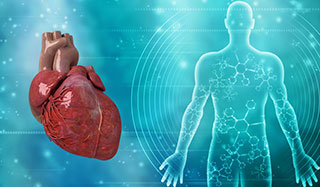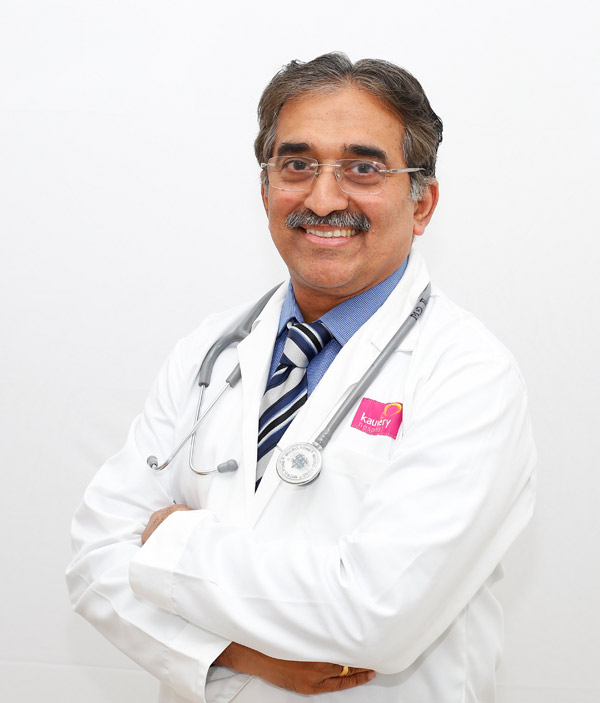Interview by Dr. K.P. Suresh Kumar, Chief Cardiologist at Kauvery Hospital Chennai to The Week magazine, dated May 15, 2021
Heart disease, hypertension, and diabetes
Heart disease is increasing at an alarming rate in India, and unfortunately, awareness levels about the same are appallingly low. Dr K.P. Suresh Kumar, chief cardiologist at Kauvery Hospital, Chennai, says, “India is the diabetes capital of the world. It is the same with hypertension (high blood pressure). Every third adult in India is hypertensive. And only 33 per cent of those who are hypertensive are aware of it.” And to make matters worse, he adds, “Again, of that group, only 33 per cent get treatment, and of that 33 per cent, only one-third of them have it under control.” Indians, especially south Indians, are more vulnerable to coronary heart disease at a young age and in middle age, he says.

These are very worrying statistics. Also, 66 per cent of diabetics have hypertension, while almost 50 per cent of people with high blood pressure have diabetes. Hypertension is one of the prime contributors to heart disease. “A huge volume of patients remains untreated, and they all develop complications of hypertension,” says the doctor.
Indians have very high visceral adiposity or fat around the abdomen, also called central obesity. “This produces insulin resistance,” says Dr Suresh, “and predisposes the patient to diabetes. Visceral fat is metabolically very active. It produces inflammatory mediators which causes inflammation of the blood vessels.” While body mass index (BMI) may be low in Indians, the waist-hip ratio is high because of central obesity, which is a very strong marker for cardiovascular disease. “Indians develop more damage to the cardiovascular system and also have high incidences of diffuse cardiovascular disease (CVD). “We develop it rapidly-a malignant course,” says Dr Suresh.
What causes heart disease?
Thanks to sedentary lifestyles, where we all seem glued to our chairs, televisions, computers, or smartphones, obesity is on the rise. “We should not be a victim of advancement,” says Dr Suresh. “Lack of exercise is the number one reason for heart disease.” It is also a major contributor to obesity. We need to get off our chairs and make walking a regular habit. “Physical activity highly benefits cardiovascular physiology. It promotes health and reduces almost all cardiovascular risk factors. Obesity per se is not dangerous. Look at Sumo wrestlers; they are overweight but didn’t die of heart attacks when they were active. Obesity is poisonous when you are not doing any physical activity.” Other factors, apart from hypertension, obesity and lack of exercise that put you at risk for heart disease are diabetes, smoking, family history of heart disease and high cholesterol.
Heart failure is weakness of the heart muscle, where the heart is unable to pump an adequate amount of blood; it is the end result of all CVD. Biomarker tests can be done to screen patients and know who are at high risk. Diabetics and hypertensive patients are at high risk. Dr Suresh tells us that there are several new medicines for heart failure. There are also new devices for treatment, but those are expensive.
Why are youngsters getting heart disease?
What is worrying is that more and more young people are having heart attacks. Many people think of heart disease as a problem of middle age and old age, because that is when the symptoms of heart disease like angina and heart attack assail people. However, this no longer holds good, and people in their twenties and thirties are increasingly becoming prone to heart problems.
For young people, they have unusual risk factors. If the homocysteine level is high, the clotting tendency of the blood is high. “They can develop deep vein thrombosis (DVT), coronary arterial thrombosis, and CVD,” says Dr Suresh. His advice to youngsters: “If you have a family history of premature heart disease or cardiovascular risk factors like diabetes, hypertension, high cholesterol, obesity, addiction to tobacco products, or abuse addictive drugs, then you are at high risk. There are a lot of screening tests available, and I would recommend they go once a year for a treadmill test and do lipid profile, and check their sugar, creatinine and thyroid levels.”
For people with family history, it is not that heart disease shows up overnight. What appears first are fatty streaks. “It takes decades for fatty streaks to develop into a plaque. So, you need to retard the progression of the disease by following a healthy lifestyle,” he says.
Many people ask whether stress can cause heart attacks. Dr Suresh says, “Stress per se does not cause heart attacks, but could indirectly contribute to the development of cardiac disease, because a stressed patient may not follow a healthy lifestyle and could be poorly com[1]pliant with medications. It’s all about how you handle stress. Yoga, meditation, a healthy lifestyle, and a balanced diet can help.”
Symptoms of heart attacks
So, how do you know if you are having a heart attack? Chest pain is, of course, the most familiar symptom. However, the doctor points out that there are many atypical symptoms that you need to watch out for. The first is retrosternal (behind the breastbone or sternum) burning discomfort in the chest. “Many people think that it is acidity,” says Dr Suresh. Even if you believe it is discomfort or indigestion, it is always better to get it checked. Recurrent vomiting is another symptom. “Post-prandial discomfort—if you are not able to do physical activity after food intake—can also point to disease. All these are evidence of a blockage,” he says.
Many patients have a heart attack without experiencing pain (silent heart attack). Dr Suresh explains, “This is common in diabetics because long-standing diabetes will damage the pain-carrying nerves. This is also the case with elderly people. Similarly, females have less intensity of pain. This is because, generally, they tolerate more pain since they experience menstrual pain and labour pains.”
So how do we find out if we do have heart disease? Dr Suresh advises, “Do a treadmill test, called an exercise ECG, every year if you are above 30 with presence of cardiac risk factors. It is a very good way of screening for heart disease and is available in every hospital. If the treadmill test shows positive for heart disease, then the patient needs to do a coronary angiogram.”
If you do have chest pain, he advises, “Go to the nearest hospital, where any doctor can diagnose with an ECG. They will do a blood test—the troponin test—to check the troponin levels in the blood. They get elevated very early when there is damage to the heart muscle.” If you are diagnosed with a heart attack, then you need to go at the earliest to a hospital that has the facilities to treat you. The doctors will do a coronary angiogram, find the block, and do a primary angioplasty with stenting. This is the treatment of choice for any patient coming into the hospital with a heart attack without any delay. If the hospital does not have the facilities, then they give clot busters. “The new generation of clot busters are expensive, but they are fast-acting and clot-specific for any patient coming into the hospital with a heart attack without any delay. If the hospital does not have the facilities, then they give clot busters. “The new generation of clot busters are expensive, but they are fast-acting and clot-specific and much safer,” he says.
Dr Suresh stresses on the need to reach the hospital within 90 minutes of getting the pain. “This is called the golden hour. With each minute that passes, your heart muscle gets damaged,” he says. “When you experience any kind of chest discomfort that you have never experienced before, think about your heart and go to the nearest hospital. If you delay, it can cause irreversible damage to the heart, leading to cardiac failure or sudden cardiac death due to arrhythmia.” It is advisable to get to an interventional cardiology centre when a heart attack is suspected.
Patients have doubts and questions on whether they should get a stent or go for bypass surgery. That is a decision taken by doctors depending on the patient’s condition. “With stents, blocks can develop elsewhere or in the same vessel, and the patient will require stenting again,” says Dr Suresh. “With bypass, this does not matter since the grafting is done at the distal part of the blood vessel. Today there have been advances in stenting with better designs, better imaging modalities and better medicines (blood thinners and statins). More patients and doctors are opting for angioplasty than bypass surgery; both give equally good results. With angioplasty, the patient requires only one day’s stay at the hospital.”
Patients have doubts and questions on whether they should get a stent or go for bypass surgery. That is a decision taken by doctors depending on the patient’s condition. “With stents, blocks can develop elsewhere or in the same vessel, and the patient will require stenting again,” says Dr Suresh. “With bypass, this does not matter since the grafting is done at the distal part of the blood vessel. Today there have been advances in stenting with better designs, better imaging modalities and better medicines (blood thinners and statins). More patients and doctors are opting for angioplasty than bypass surgery; both give equally good results. With angioplasty, the patient requires only one day’s stay at the hospital.”
In conclusion
Is heart disease preventable? Certainly yes, to a great extent. Any number of healthy, elderly people have demonstrated that. If you lead a healthy lifestyle, have healthy eating habits, exercise regularly and maintain optimum body weight, it will go a long way in preventing heart disease. After all, life is not all about disease. It is about health, and that is in our hands.
Covid and Heart DiseaseAs the Covid-19 pandemic unfolds, we learn more and more about the devastating effects of the virus on our bodies. While initially it was thought to affect the respiratory system, today we know that it affects many different parts of our body, the heart included. Dr Suresh has treated over 300 Covid-19 patients and has performed angioplasties in at least 20. “Covid-19 produces a prothrombotic state in the blood which makes the blood more coagulable, that is, it increases the clotting tendency of the blood and causes deep vein thrombosis, stroke or blockage of the arteries of the lungs, heart, brain and legs. Consistently elevated D-dimer levels is an indicator that the blood clotting tendencies are high.” And the scary part of this is that even patients who have no history of heart disease can develop any of these conditions if they contract Covid-19.
“Patients will need a very high dose of blood thinning medications for a minimum of four to six weeks,” says Dr Suresh. “This is for people with moderate to severe Covid-19. Covid pneumonia is dangerous, too, as it produces extensive clotting of the microvasculature of the lungs, marked hypoxia, and pulmonary thrombo-embolism. There are higher instances of heart attacks with extensive blood clots in people who have Covid-19.” So, until all of us get fully vaccinated, the only thing we can do is stay safe. Social distancing, wearing masks and washing hands will go a long way if each one of us practices it! As the age-old saying goes: Prevention is better than cure.
Interview by Dr. K.P. Suresh Kumar, Chief Cardiologist at Kauvery Hospital Chennai to The Week magazine, dated May 15, 2021
Article Courtesy – https://www.theweek.in/news/health/2021/05/15/preventing-heart-disease.html

Dr K.P. Suresh Kumar
Chief Cardiologist
Kauvery Hospital, Chennai

